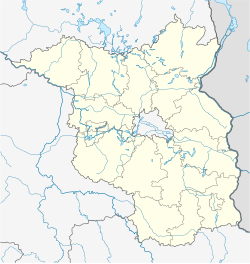
Back Potsdam Afrikaans Potsdam ALS ፖትስዳም Amharic Potsdam AN بوتسدام Arabic بوتسدام ARZ Potsdam AST Potsdam Aymara Potsdam Azerbaijani پوتسدام AZB
Potsdam | |
|---|---|
View over Potsdam with Babelsberg Park Old City Hall | |
| Coordinates: 52°24′02″N 13°03′33″E / 52.40056°N 13.05917°E | |
| Country | Germany |
| State | Brandenburg |
| District | Urban district |
| Founded | 1776 |
| Government | |
| • Lord mayor (2018–26) | Mike Schubert[1] (SPD) |
| Area | |
• Total | 187.28 km2 (72.31 sq mi) |
| Elevation | 32 m (105 ft) |
| Population (2022-12-31)[2] | |
• Total | 185,750 |
| • Density | 990/km2 (2,600/sq mi) |
| Time zone | UTC+01:00 (CET) |
| • Summer (DST) | UTC+02:00 (CEST) |
| Postal codes | 14467–14482 |
| Dialling codes | 0331 |
| Vehicle registration | P |
| Website | www.potsdam.de |
Potsdam (German pronunciation: [ˈpotsdam] ⓘ) is the capital and largest city of the German state of Brandenburg. It is part of the Berlin/Brandenburg Metropolitan Region. Potsdam sits on the River Havel, a tributary of the Elbe, downstream of Berlin, and lies embedded in a hilly morainic landscape dotted with many lakes, around 20 of which are located within Potsdam's city limits. It lies some 25 kilometres (16 miles) southwest of Berlin's city centre. The name of the city and of many of its boroughs are of Slavic origin.
Potsdam was a residence of the Prussian kings and the German Emperor until 1918. Its planning embodied ideas of the Age of Enlightenment: through a careful balance of architecture and landscape, Potsdam was intended as "a picturesque, pastoral dream" which would remind its residents of their relationship with nature and reason.[3]
The city, which is over 1,000 years old, is widely known for its palaces, its lakes, and its overall historical and cultural significance. Landmarks include the parks and palaces of Sanssouci, Germany's largest World Heritage Site, as well as other palaces such as the Orangery Palace, the New Palace, Cecilienhof Palace, and Charlottenhof Palace. Potsdam was also the location of the significant Potsdam Conference in 1945, the conference where the three heads of government of the USSR, the US, and the UK decided on the division of Germany following its surrender, a conference which defined Germany's history for the following 45 years.
Babelsberg, in the south-eastern part of Potsdam, was already by the 1930s the home of a major film production studio and it has enjoyed success as an important center of European film production since the fall of the Berlin Wall. The Filmstudio Babelsberg, founded in 1912, is the oldest large-scale film studio in the world.[4]
Potsdam developed into a centre of science in Germany in the 19th century. Today, there are three public colleges, the University of Potsdam, and more than 30 research institutes in the city.
- ^ Ergebnis der Bürgermeisterwahl in Potsdam Archived 2022-08-15 at the Wayback Machine, accessed 30 June 2021.
- ^ "Bevölkerungsentwicklung und Bevölkerungsstandim Land Brandenburg Dezember 2022" (PDF). Amt für Statistik Berlin-Brandenburg (in German). June 2023.
- ^ The Potsdam project, 1996, HRH The Prince of Wales, Charles; Hanson, Brian; Steil, Lucien; Prince of Wales's Urban Design Task Force; Prince of Wales's Institute of Architecture, Prince of Wales's Institute of Architecture, 1998, Introduction.
- ^ "About us".











